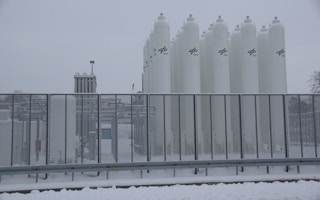Leaked hydrogen fuel is 11 times more powerful than carbon dioxide in causing global warming, according to a study released by the United Kingdom government.
To continue reading, subscribe to Eco‑Business.
There's something for everyone. We offer a range of subscription plans.
- Access our stories and receive our Insights Weekly newsletter with the free EB Member plan.
- Unlock unlimited access to our content and archive with EB Circle.
- Publish your content with EB Premium.
That’s more than twice the figure given in previous estimates, which do not fully account for how the lightest gas on Earth interacts with other greenhouse gases in the atmosphere, the report said.
The warning comes amid high interest globally in hydrogen to replace fossil fuels in power plants, transport and industrial systems. Hydrogen produced with renewable energy is widely seen as a low-carbon fuel. While expensive today, costs are expected to drop with better technology later this decade.
“Minimisation of leaks needs to be a priority if hydrogen is adopted as a major energy source,” the study said. In another report the UK government published in March, the biggest source of leaks are found to be in the production and transport of hydrogen fuel.
The report modelled a scenario of “widespread” hydrogen usage – closer to what’s projected for around 2050. By then, buildings would have completely switched to hydrogen fuel for heating, the transport sector replaced half of its fossil fuels with the gas, and 10 per cent of the power sector would be hydrogen-fueled.
These are huge figures compared to today, where the dominant forms of hydrogen production, derived from natural gas and coal, only use up 6 and 2 per cent of the fuels, respectively.
Abetting methane
Based on computer models, the report found that hydrogen can increase the atmospheric lifetime of methane through their chemical interactions.
Methane is a powerful greenhouse gas but stays in the atmosphere for just over a decade, compared to hundreds of years for carbon dioxide, the main culprit for global warming. It is the dominant constituent of natural gas and is responsible for causing a quarter of the current global temperature rise.
Methane molecules will stay in the air one year longer on average, if the concentration of hydrogen in the air doubles from today’s levels, said the report.
If the concentration of atmospheric hydrogen triples – the upper limit of what the study considered realistic in the future – the higher retention rate of airborne methane could even offset the reduction of methane emissions from using less fossil fuels. In this case, hydrogen leakage will contribute to over 0.4 degrees Celsius of temperature rise.
Over 100 countries pledged to reduce methane emissions by 30 per cent by 2030 at COP26, the latest global climate meet, though fossil fuel powerhouses China, India, Russia and Australia opted out.
Atmospheric methane levels have been rising exponentially in recent years. Huge plumes have been detected near oil wells and gas pipelines.
Boosting the wrong ozone layer
The study found that hydrogen gas could also increase the amount of ozone in the lower atmosphere. A tripling of atmospheric hydrogen will raise ozone levels by just under 2 per cent.
While the ozone layer in the upper atmosphere protects Earth from harmful solar radiation, ozone closer to the ground acts like a greenhouse gas, trapping in heat. It can also cause respiratory illnesses and affect plant growth.
Excess ozone comes from man-made air pollutants like carbon monoxide, volatile organic compounds and nitrogen oxides. Replacing fossil fuels with clean hydrogen can cut down on these pollutants, as long as the hydrogen doesn’t leak out of pipelines.
“Maximising these reductions should be a further policy priority,” it added.
On the flip side, huge hydrogen leaks could cause ozone in the upper atmosphere to thin out in the South Pole, allowing in more harmful sun rays that can cause cancer in people.
“This is certainly new information,” Tim Buckley, director of Australian think-tank Climate Energy Finance, said of the report’s findings.
Buckley said there should be increased transparency, monitoring and oversight of hydrogen fuels, just as similar measures are being introduced for natural gas pipelines.
He added that the report should be kept in perspective, as methane from fossil fuel use and production still clearly outweighs the climate risks of hydrogen leaks, especially if the hydrogen was produced with renewable energy.
The report itself stated that replacing fossil fuel with clean hydrogen has “significant climate benefits”.
Buckley said the report is timely, as fit-for-purpose hydrogen infrastructure is only starting to be built now, and their design can be improved to reduce gas leakage.
“Hydrogen is not perfect, it is one of many potential solutions,” Buckley said, adding that proven technology such as wind and solar energy needs to be at the forefront of the energy transition.










